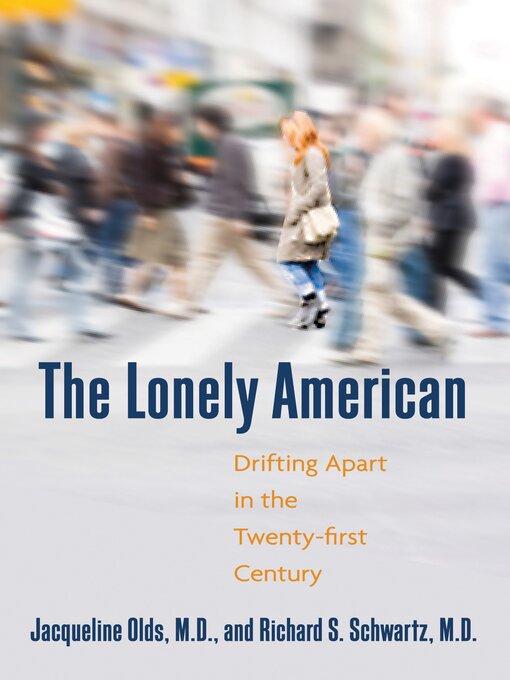The Lonely American
Drifting Apart in the Twenty-first Century
In The Lonely American, cutting-edge research on the physiological and cognitive effects of social exclusion and emerging work in the neurobiology of attachment uncover startling, sobering ripple effects of loneliness in areas as varied as physical health, children's emotional problems, substance abuse, and even global warming. Surprising new studies tell a grim truth about social isolation: being disconnected diminishes happiness, health, and longevity; increases aggression; and correlates with increasing rates of violent crime. Loneliness doesn't apply simply to single people, either—today's busy parents "cocoon" themselves by devoting most of their non-work hours to children, leaving little time for friends, and other forms of social contact, and unhealthily relying on the marriage to fulfill all social needs.
As a core population of socially isolated individuals and families continues to balloon in size, it is more important than ever to understand the effects of a culture that idealizes busyness and self-reliance. It's time to bring loneliness—a very real and little-discussed social epidemic with frightening consequences-out into the open, and find a way to navigate the tension between freedom and connection in our lives.
-
Creators
-
Publisher
-
Release date
February 1, 2009 -
Formats
-
Kindle Book
-
OverDrive Read
- ISBN: 9780807095966
-
EPUB ebook
- ISBN: 9780807095966
- File size: 208 KB
-
-
Languages
- English
-
Reviews
-
Publisher's Weekly
December 15, 2008
This workmanlike book takes up where Robert D. Putnam’s classic Bowling Alone
left off in examining the disintegration of community in 21st-century America. Americans, say the authors (both associate clinical professors of psychiatry at Harvard Medical School), have a conflicted views of community: on the one hand, they glorify rugged individualism and, on the other hand, they encourage community and look down on those who cast off community to go it alone. Drawing on interviews with their patients and on numerous studies, Olds and Schwartz point out that being a loner isn’t all it’s cracked up to be, and many who shun community are surprised at how lonely and socially isolated they feel. The authors conclude that Americans drift away from social connections because of the frenetic and overscheduled intensity of modern life as well as the American pantheon of self-reliant heroes. The authors restate what numerous studies have already shown: social isolation can lead to unhappiness and can have a detrimental impact on one’s physical well-being and that of the larger society. The repetitious and slightly haranguing style detracts from, rather than adds to, the authors’ message. -
Library Journal
November 1, 2008
Like seminal works such as Robert D. Putnam's "Bowling Alone: The Collapse and Revival of American Community", David Riesman's "The Lonely Crowd: A Study of the Changing American Character", and Philip Slater's "The Pursuit of Loneliness", this recent addition to the sociological and psychological literature on loneliness is a substantive contribution. Coauthors Olds and her husband, Schwartz (both associate clinical professors of psychiatry, Harvard Medical Sch.), reaffirm Putnam's thesis that a sense of community is vanishing from America and that we suffer from our increasing isolation from one another. Olds and Schwartz argue that our culture fosters a pervasive belief that we must be constantly busy, yet this very "busyness" isolates us as we work harder and longer, seeking comfort through empty productivity. Exhaustion and depression set in, and we retreat from others, creating a vicious circle of loneliness. The authors capture the essence of our depressed and disjointed culture, especially now that the economy is failing and workaholism is no longer a viable refuge for many. They offer no foolproof solutions, but they do successfully generate awareness of the problem and encourage the ubiquitous lonely Americans to seek attachment and commitment as they pursue happiness. Highly recommended for all public and university libraries.Lynne F. Maxwell, Villanova Univ. Sch. of Law, PACopyright 2008 Library Journal, LLC Used with permission.
-
Formats
- Kindle Book
- OverDrive Read
- EPUB ebook
subjects
Languages
- English
Loading
Why is availability limited?
×Availability can change throughout the month based on the library's budget. You can still place a hold on the title, and your hold will be automatically filled as soon as the title is available again.
The Kindle Book format for this title is not supported on:
×Read-along ebook
×The OverDrive Read format of this ebook has professional narration that plays while you read in your browser. Learn more here.


